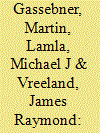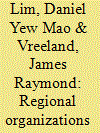|
|
|
Sort Order |
|
|
|
Items / Page
|
|
|
|
|
|
|
| Srl | Item |
| 1 |
ID:
120122


|
|
|
|
|
| Publication |
2013.
|
| Summary/Abstract |
What determines the emergence and survival of democracy? The authors apply extreme bounds analysis to test the robustness of fifty-nine factors proposed in the literature, evaluating over three million regressions with data from 165 countries from 1976 to 2002. The most robust determinants of the transition to democracy are gross domestic product (GDP) growth (a negative effect), past transitions (a positive effect), and Organisation for Economic Co-operation and Development membership (a positive effect). There is some evidence that fuel exporters and Muslim countries are less likely to see democracy emerge, although the latter finding is driven entirely by oil-producing Muslim countries. Regarding the survival of democracy, the most robust determinants are GDP per capita (a positive effect) and past transitions (a negative effect). There is some evidence that having a former military leader as the chief executive has a negative effect, while having other democracies as neighbors has a reinforcing effect.
|
|
|
|
|
|
|
|
|
|
|
|
|
|
|
|
| 2 |
ID:
065856


|
|
|
|
|
| Publication |
London, Routledge, 2006.
|
| Description |
xix, 508p.
|
| Standard Number |
0415700868
|
|
|
|
|
|
|
|
|
|
|
|
Copies: C:1/I:0,R:0,Q:0
Circulation
| Accession# | Call# | Current Location | Status | Policy | Location |
| 050143 | 332.152/RAN 050143 | Main | On Shelf | General | |
|
|
|
|
| 3 |
ID:
081560


|
|
|
|
|
| Publication |
2008.
|
| Summary/Abstract |
This article addresses a puzzle: dictatorships that practice torture are more likely to accede to the UN Convention Against Torture (CAT) than dictatorships that do not practice torture. I argue the reason has to do with the logic of torture. Torture is more likely to occur where power is shared. In one-party or no-party dictatorships, few individuals defect against the regime. Consequently, less torture occurs. But dictatorships are protorture regimes; they have little interest in making gestures against torture, such as signing the CAT. There is more torture where power is shared, such as where dictatorships allow multiple political parties. Alternative political points of view are endorsed, but some individuals go too far. More acts of defection against the regime occur, and torture rates are higher. Because political parties exert some power, however, they pressure the regime to make concessions. One small concession is acceding to the CAT
|
|
|
|
|
|
|
|
|
|
|
|
|
|
|
|
| 4 |
ID:
137115


|
|
|
|
|
| Summary/Abstract |
Bailouts sponsored by the International Monetary Fund (IMF) are famous for their conditionality: in return for continued installments of desperately needed loans, governments must comply with austere policy changes. Many have suggested, however, that politically important countries face rather weak stringency. Obstacles to testing this hypothesis include finding a measure of political importance that is not plagued by endogeneity and obtaining data on IMF conditionality. We propose to measure political importance using temporary membership on the UN Security Council and analyze a newly available data set on the level of conditionality attached to (a maximum of) 314 IMF arrangements with 101 countries over the 1992–2008 period. We find a negative relationship: Security Council members receive about 30 percent fewer conditions. This suggests that the major shareholders of the IMF trade softer conditionality in return for political influence over the Security Council.
|
|
|
|
|
|
|
|
|
|
|
|
|
|
|
|
| 5 |
ID:
119686


|
|
|
|
|
| Publication |
2013.
|
| Summary/Abstract |
Do regional hegemons use their power in regional organizations to advance foreign policy objectives? The authors investigate whether Japan leverages its privileged position at the Asian Development Bank (adb) to facilitate project loans for the elected Asian members of the United Nations Security Council (UNSC), a platform from which it seeks to shape global affairs. Analyzing panel data of adb loan disbursements to twenty-four developing member-countries from 1968 to 2009, the authors find that temporary UNSC membership increases adb loans, particularly during the post-1985 period, when Japan asserted greater influence in multilateral organizations. They estimate an average increase of over 30 percent. Because of Japan's checkered history of imperialism, the adb provides a convenient mechanism by which the government can obfuscate favors for politically important countries. Acting through this regional organization enables Japan to reconcile a low-key approach to foreign affairs with the contradictory goal of global activism-leading without appearing unilateralist.
|
|
|
|
|
|
|
|
|
|
|
|
|
|
|
|
|
|
|
|
|